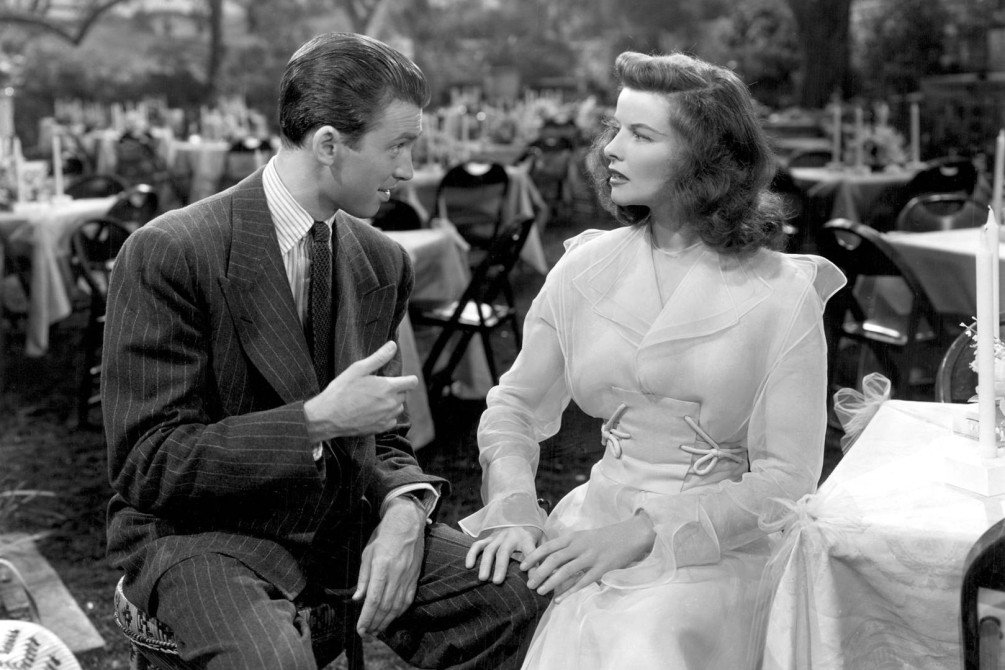The Philadelphia Story (1940)
QFS No. 142 - The invitation for May 29, 2024
Time to curl up with a classic Hollywood movie. And The Philadelphia Story is about as classic as it comes. Jimmy Stewart? Check. Cary Grant?! Check. Katherine Hepburn?!? Check. The great George Cukor at the helm?!?! Check and mate.
I have never seen this film, which is a strange blind spot. The Philadelphia Story frequently comes up as one of the films of the era that has endured the test of time so I don’t have any explanation as to how I missed this in my viewing history.
George Cukor – you might recall from the QFS email about Gaslight (1944, QFS No. 106) that you likely have printed out and framed like you do with all of these – is one of the great workhorse elite Hollywood filmmakers of the day, eventually winning an Academy Award for 1964’s My Fair Lady. So you know it’s going to be a solid film even if you hadn’t already knew about it.
So join me in seeing the iconic performers in the classic The Philadelphia Story and then join us in discussing it!
Reactions and Analyses:
Do you need much of a plot if you have legendary actors and great dialogue? That question, or some version of that, dominated our discussion about The Philadelphia Story (1940). Comedy sometimes cannot transcend eras, but The Philadelphia Story is one of those films that continues to endure.
And why? This is not a cynical or facetious question – but what is it in a comedy that is funny more than 80 years ago that remains funny today? Physical comedy and slapstick can last beyond the time in which it was created – our December screening of the Marx Brothers’ A Night at the Opera (1935, QFS No. 132) illustrated that for us. But George Cukor’s comedy has really none of that physical comedy. And yet, throughout the film the dialogue and the performances are genuinely funny.
At the same time, the plot of The Philadelphia Story is an afterthought. That’s not to say it’s devoid of one – it’s nominally about a wealthy bride (Katharine Hepburn as Tracy Samantha Lord) on her wedding weekend with the wedding coming up. So we have a timeframe, a clicking clock. Throw in a plot to infiltrate this high society with a “secret” photographer (Ruth Hussey as Liz Imbrie) and journalist (Jimmy Stewart as Mike Connor) writing a story for a gossip magazine – all facilitated by the woman’s ex-husband C.K. Dexter Haven (Cary Grant).
But then, what is still the central tension? Is it this question who will Tracy marry? Or is it will Mike and Liz be found out as spies for Spy magazine? The latter gets dispelled rather quickly, so that’s not it. The former – well, that’s not really posed as a question until far later, when it’s clear that Tracy and Mike have some kind of a connection.
And the resolution – that her fiancé George (John Howard), unsure of Tracy’s moral rectitude, decides to leave her, Katharine returns to Dexter and gets “remarried” to him with the guests who should have been there when she first married him years ago.
Just writing all of that made my head spin. And so - is this why this is the quintessential screwball comedy?
One aspect of the film that people have rightly observed over the decades is class, and that came up in our discussion as well. A QFS member very astutely pointed out that this film is ultimately a very cynical take on class. George, the fiancé, has pulled himself up by his bootstraps from middle class (or poverty) into high society with Tracy and her family. But he is derided throughout the film from the start, with subtle jabs at his upbringing.
Take for example a simple scene early on, as pointed out by one of our members. George is at the stables with Tracy and the rest of her family. He is the only one who has trouble mounting a horse – presumably, he didn’t grow up with them on his estate – and everyone sort of laughs at him, even Uncle Willie (played with unnerving creepiness by Roland Young) rolls his eyes and says, “Hi ho, Silver” derisively.
Meanwhile, Dexter is still beloved by everyone except his ex-wife Tracy. Her sister, Dinah (Virginia Weidler) openly wishes he came to the wedding and when he does arrive at the house her mother (Mary Nash) can’t keep her hands off of him. This is a man, mind you, the very first scene of the movie we see of him shoving Tracy down physically with a palm to the face! But he’s forgiven by most and perhaps it’s because of a reason unsaid: he’s a member of the class and belongs with his kind.
Then comes Mike, played with Stewart’s uncanny everyman persona. He connects with Tracy and she finds depth in his writing and they are drunk and fall in lust or love or something. But even he – he of the working class – when it’s time at the end of the movie and he hastily proposes to Tracy, she rebuffs him.
The film seems to be saying – it’s all well and good to mingle between classes on some drunken weekend. But that’s all for fun because when it comes down to it you’ll get hitched to the one who is of your own kind.
This is a pretty stark take but it’s all there in the film. There seems no good reason to me, at least (and most of us) for Tracy to end up back with Dexter. Is it that Dexter has sobered up and has changed and she sees that? If that’s the case, it’s barely in the film’s narrative at all. Is it that Dexter now sees Tracy as not a goddess but as a human? That doesn’t come out either. If anything, Mike is closest to saying that Tracy has humanity and depth but even he treats her as if she’s this luminescent creature.
In the end, perhaps all of this ultimately doesn’t matter. Perhaps a loose plot is the maximum you need when you have legendary performers behaving badly. Jimmy Stewart is a downright fantastic alcoholic in this film, and Katharine Hepburn is no slouch either. You could do worse than watching ninety minutes straight of these two getting supremely sloshed and hamming it up on screen.
And perhaps, ultimately, that’s why this film has endured, what so many filmmakers today find this film unassailable as a romantic comedy. Maybe that’s all that matters in making a classic – a fun, slightly superficial, dastardly romp with the wealthy behaving in ways we imagine the wealthy to behave behind closed doors. Which is the exact assignment Mike and Liz were given in the first place. We, the audience, are the ones who actually get to see that story play out on screen in front of us.





